 I was recently drawn to a passage of The Prophet, by Khalil Gibran about the nature and spirit of giving: Then said a rich man, "Speak to us of Giving." And he answered: You give but little when you give of your possessions. It is when you give of yourself that you truly give. For what are your possessions but things you keep and guard for fear you may need them tomorrow? And tomorrow, what shall tomorrow bring to the overprudent dog burying bones in the trackless sand as he follows the pilgrims to the holy city? And what is fear of need but need itself? Is not dread of thirst when your well is full, thirst that is unquenchable? There are those who give little of the much which they have - and they give it for recognition and their hidden desire makes their gifts unwholesome. And there are those who have little and give it all. These are the believers in life and the bounty of life, and their coffer is never empty. There are those who give with joy, and that joy is their reward. And there are those who give with pain, and that pain is their baptism. And there are those who give and know not pain in giving, nor do they seek joy, nor give with mindfulness of virtue; They give as in yonder valley the myrtle breathes its fragrance into space. Though the hands of such as these God speaks, and from behind their eyes He smiles upon the earth. - Khalil Gibran, the Prophet Village Culture promotes spiritual development through sacrifice. And here in the Agbole, we are compelled to look even more deeply into the nature of sacrifice. What is the spirit in which we perform our sacrifices? Are we giving with all of our hearts and souls, or are we merely acting out of convenience? Your spirit can be transformed and purified through the sincerity of your sacrifice if you are truly giving the fullness of yourself. To do so requires not only an accurate assessment of what you have, but also who you are. What are you really made of? Ultimately, the only way you can be healed through sacrifice is to make offerings from the essence of your heart and soul. This is what it means to make money work for the Good Condition. 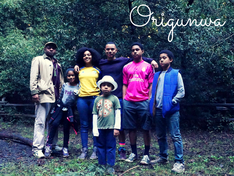 Owonrinyeku Okanyekuyeku Yeku, the son of Orunmila divined for Orunmila On the day he had no money to spend He was asked to perform an offering He heard about the offering and performed it Ever since, he began to have money at home - Holy Odu OwonrinOyeku Money at home is different from money in the streets or money in the market. When you have money at home, you're taking care of the business of uplifting your family; food, clothes, shelter, medicine, books, tuition, extracurricular activities, vacations and so on. Orisa Lifestyle prioritizes strengthening the family for generations to come, which cannot be done without money. That said, you need to realize the fact that money doesn't come only from a paycheck! You must also be an entrepreneur. A job will pay you according to what is convenient to your employer. Your business will pay you according to the intelligence of your hustle. Live the medicine. Learn more about how money can heal at www.Agbole.weebly.com  Fish reside in Water Rats cannot persist there Wherever one fits, is where one lives If a fly bites in one's sleep The person will jump up swiftly Unless he has perished Cast divination for a bold palm wine tapper Who claimed that the neck of the palm tree was so convenient He would not climb down the tree again Elegbara told the tapper to offer one calabash with 740 cowries So that he does not go from a good place to a bad situation No one will remove the twisted rope used to climb Ope No one The people in the front offered The people in the back refused - Holy Odu OgundaIka When my children were younger, they would ask me to give them a boost up into a tree or onto the play structure. I always refused. "Why?!" They never liked it but they accepted my response; "If I put you up, how will you figure out how to get down?" By the time my eldest was about eight, he had verified my claim and eagerly passed down the explanation to his younger siblings. Getting up is only half of the task. When you know what it takes to reach a certain destination or level of achievement, you will have a natural appreciation for what it takes to be successful. Not only that, you'll probably start thinking of ways to sustain your good position. If you're wise, you will respond favorably to that impulse to keep your position. Sometimes, when you climb up to a higher place, you don't want to get down! How many people make sacrifice when they have reached the top of their game? If you're like most people, you don't see the need to sacrifice when you have what you want. It seems to be a law of nature that energy increases, plateaus and then declines. And while it would be unrealistic to expect that the good times will continue forever, let's challenge the rate of decline. In Mexico, for example, they say "If the grandfather was a hard worker, the son will be spoiled and the grandson will be a beggar. " It means that wealth rises and falls within three generations. And while we must accept that wealth is subject to rise and fall over time, we can challenge the fact that it must happen within three generations. What if we extended the first phase, where hard work generates wealth? The Yoruba say that Hard work is the antidote to poverty. What would happen if the second and third generations insisted upon making the same kinds of sacrifices that were made in the first generation? Is it possible that we can maximize our growth and minimize our decline? In the verse above, Ifá teaches us that it is where one fits that one should live. The bold palm wine tapper was told to sacrifice so that he could remain in the tree, tops. Let us take it as a metaphor for continuous improvement. Living the medicine means making the necessary sacrifice for constant elevation, growth and expansion. Learn more at www.Agbole.com Obafemi Origunwa, MA | www.ObafemiO.com It seems almost sacrilegious to say so, but money can heal the human soul. Of course, you cannot pray to it, worship it, or even believe in it, but money can definitely heal the soul. This is particularly the case when we consider the collective soul of a people. Yoruba elders of West Africa will sometimes say, Charity is the father of sacrifice. It means that charity is a practice that transforms the otherwise ordinary act of giving into something sacred. In a more practical sense, this proverb reflects the communal support that is built into the Yoruba spiritual tradition, which is governed by Ifa Divination. That is, when Yoruba people make important decisions, they traditionally visit the Babalawo (Ifa priest) in order to consult the Ifa oracle. Each divination is activated through sacrifice, which typically includes goats, chickens, yams and other foods. And while a small portion of the sacrifice is offered at the altar, the vast majority is prepared and shared with the family and local community. And so it is that, the community is continuously being nourished by the spiritual pursuits of its members, whose sacrifices are not considered complete until they have been shared with the people.
Thus, Yoruba tradition demonstrates both secular and sacred ways in which giving and receiving go together. You cannot have one without the other. More importantly, when you give, and someone receives, both parties are elevated a little closer to the highest aspirations of humanity. Recall, for example, a time when you freely gave someone a gift. As the giver, your spirit was elevated through your generosity. When you give something away as a gift, you experience a unique mix of freedom, combined with a sense of hope. Likewise, think of a time when you received a gift or love offering. Maybe it was something you received from a small child, a dear friend or an elderly grandparent. When you are the recipient of a gift, your spirit is elevated by accepting the love expressed in the offering, as well as the implicit obligation to make good on the gift. In this way, the Good Condition manifests through the act of giving and receiving. Now, let's give some consideration to what happens when people give and receive money as a form of offering or sacrifice. In the same way that the community is fed each time someone consults Ifa, the community can also be increased by monetary offerings. That is, in exactly the same ways that the human body is healed through the circulation of blood - which is enriched by healthy foods - the collective body can be healed through the circulation of money. This is what we call the adugbo, or commonwealth. Libraries, parks, schools, temples, streams, air, forests, gardens, language, arts, folklore and tradition are all features of the commonwealth. They belong to everyone. Most significantly, when the commonwealth is made financially strong, even individuals who lack money are enriched, their spirits are perpetually lifted. Enriching the Adugbo The heart of the adugbo is the Agbole, which represents the most basic social and political unit of the commonwealth. Stated another way, the Agbole organizes a network of social institutions that provide a range of human services. In this way, the adugbo cultivates village culture, which is commonly expressed as good character. Of this, the Holy Odu ObaraIwori teaches the following: Orobanta-awuwobi-owu divined Ifa for the world on the day all the world’s people declared that money is the most important thing in the world. They would give up everything and continue to run after money. Orunmila said: Your thoughts about money are right and your thoughts about money are wrong. Ifa is what we should honor. We should continue to adore both of them. Money exalts a person; money can spoil a person’s character. If anyone has too much love for money, his character will be spoiled. Good character is the essence of beauty. If you have money, it does not prevent you from becoming blind, mad, lame, and sick. You can be infected by diseases. You should go and increase your wisdom, readjust your thinking. Cultivate good character, acquire wisdom, go and perform sacrifice in order that you may be at ease. They asked, “What is the sacrifice? The sacrifice included rats, fish, goats, a calabash of cornmeal, a calabash of bean meal, and twenty thousand cowries. They refused to sacrifice. They insulted and ridiculed the babalawos and other practitioners of traditional medicine. After a while, they began to be sick. They were ill and sad and had nobody to attend them. They were dying daily. They were faced with the problems of decaying bodies and could not ask the babalawos and others for help. When they could no longer bear the burden, they went and apologized to the babalawos. Since that day, the babalawos have been treated with honor in the world. - Holy Odu ObaraIwori And so, it is through our spiritual discipline that we can use money to bring about the Good Condition. Learn more about how you can get involved. Act Now!  In Spanish, there is a popular phrase that says, "Abuelo arriero, hijo caballero, nieto pordiosero," which is translated as, "Grandfather, hard worker. Son, gentleman. Grandson, beggar." It means that family wealth is typically gained and lost within three generations. Coincidentally, perhaps, this parallels what physicists tell us about the behavior of energy, which is said to transition from creation to stasis and finally dissipation. The energy never disappears, of course. It eventually becomes part of another creation and the cycle repeats endlessly. The Agbole - which is deliberately organized as an extended family institution - aspires to break the cycle of wealth dissipation by extending the creation phase so that it lasts at least one hundred years. As a family, if the Agbole fails to sustain the creative enthusiasm and passion of the first generation, we increase the risk of our wealth slipping into stasis and then dissipation. Here, it's a good idea to offer up a working definition of wealth. Family wealth manager, James E. Hughes tells us that family wealth consists of three forms of capital:
Even more importantly, Hughes goes on to emphasize the fact that few families have understood that without active stewardship of their human and intellectual capital, they cannot preserve their financial capital. This means that, in addition to generating financial capital, the successful family will also develop and maintain a vigorous succession plan that assures that wealth continues to grow from one generation to the next. One way in which the Agbole intends to operationalize its wealth management plans is by making good use of the traditional Yoruba family hierarchy, which can be conceptualized as a pyramid:
Every Agbole project will make use of all three roles. They represent what you might call the archetypes and the typical roles that the Agbole will activate on all projects. This business model is intended to encourage the generation of financial capital and support the succession plan, assuring that wealth continues to grow from one generation to the next. 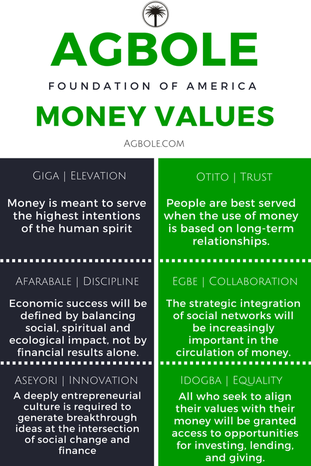 According to Yoruba tradition, the sacred use of money had its beginning in the Ejigbomekun Market, a mythological place where the deities conducted the transactions that would enable them to perform wonders in the world. It was through their earthly achievements that the deities purify and elevate their spirits in preparation for their heavenly return. This is established in the teachings of the Holy Odu OyekuLogbe, which says: A tree knot is the one that fears no rain This was Ifa's message to Olodumare Agotun The king who created the well-balanced earth When he was going to create a marketplace on water Behold! When you get to the earth Do not forget heaven For earth is but a marketplace Heaven is our home You shall give account of all your deeds While on earth - Holy Odu OyekuLogbe In this regard, we see how the marketplace, which is activated by countless transactions, draws the world of spirits into the world of things. This notion, which is borne out of African indigenous knowledge, challenges our narrow view of ancient peoples. We tend to think that our ancestors were primitive, superstitious and maybe a little stupid. But, let's consider another possibility; What if we choose to believe the sacred texts, the myths, rituals, beliefs and traditions? We are comfortable with the idea that we govern our own lives through rational thought and scientific precision. But what if we accept the possibility that there exists a world beyond our physical world, where activity is caused by forces that are beyond our ability to perceive? That is, what happens when we seriously consider the fact that, if there are causes that we can detect with our five senses, there might also be additional causes that we cannot detect until we have developed extra-sensory perception? It's important to consider the ancient concepts of money, markets and transactions because these considerations help us to redefine our relationship to money. More precisely, it's essential that modern Africans reclaim our understanding of money as a living, spiritual force that has the capacity to heal. That is, in the same way that the deities descended upon Ejigbomekun Market in order to acquire the tools and experiences that would enable them to perform wonders in the world, so can we humans, construct a marketplace wherein we can circulate money that is imbued with a healing impulse. Money circulates through the marketplace through transactions. To be sure, a transaction is an agreement between two or more parties. But where do agreements reside? Certainly not in the documents where they are articulated, nor in the courtrooms where they are reinforced. Agreements, like love, can only exist BETWEEN parties. Neither party possesses the agreement, but the two of them create, sustain and strengthen the agreement together. As the parties change and evolve, so does the agreement. Today, Africans have reached a pivotal stage of evolution that warrants a reconsideration of our agreements with one another and our collective relationship with money. More precisely, the time has come for us to use money to heal our condition and empower our future. 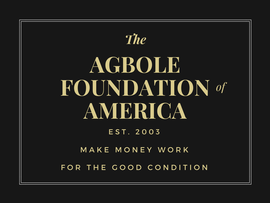 Work is a four letter word! Fewer than 6% of Americans love their work, in spite of the fact that we spend over 30% of our lives at work. No wonder half of American marriages end in divorce. Practically everybody's in a state of misery. We have sold out our dreams in order to have jobs. Consequently, work has become a dreadful place that hardly inspires a sense of awe and wonder. But labor is life! A popular Yoruba poem reads this way: Ise Logun ise, Work is the antidote for poverty ... Mura si se re, ore mi Work hard and work smart, my friend Ise la fi ndeni giga Hard and smart work brings success Bi a ko ba reni fehin ti When there is no one to rely on Bi ole la ri Its like we are lazy Bi a ko ba reni gbekele, When there is no one to trust A te ra mo se ni. We focus more on our work Iya re le lowo lowoh Your mother might be rich Baba re le lesin lekan Your father might own a thousand and one horses Ti o ba gbojule won If you rely on them O te tan ni mo so fun o In truth, you might be on sinking ground Apa lara igupa ni ye kan families are like the arm, while extended family are like the elbow B'aiye ba fe o loni If you are loved by the world today Ti o ba lowo lowo, won a tun fe o lola If you are still rich, they will love you tomorrow as well Abi ko wa nipo atata If you have an esteemed position Aiye a ye o si terin terin You will be honored with "fake"laughter Je ki o deni ti ra ngo If you unfortunately loose your money or position Ko ri bi won ti nyin mu si o They'll turn their back on you Iya mbe fomo ti ko gbon There is suffering for the foolish child Ekun mbe fomo ti nsare kiri and there is sorrow for the child that have no plan or vision Mafowuro sere ore mi Don't waste your formative years, my friend Mura sise ojo nlo. work hard and plan well now, because time waits for no one Activity and continuous struggle to make things happen represent the essence of life, in every dimension of nature. The river never ceases to reach for the sea. The most meager grass will find a way even through concrete. The journey of life is a labor of love. In the holy odu Ogunda Owonrin, Ifa teaches us that the industrious man and woman, of true dignity, who glorify work, are on their way to affluence and victory over all enemies. Ifa teaches us that it is through our work that we transcend the small mindedness of others. Deeds are seeds! The harvest will appear in due season!!!! Ase! |
AgboleMake money work for Archives
January 2016
Categories |
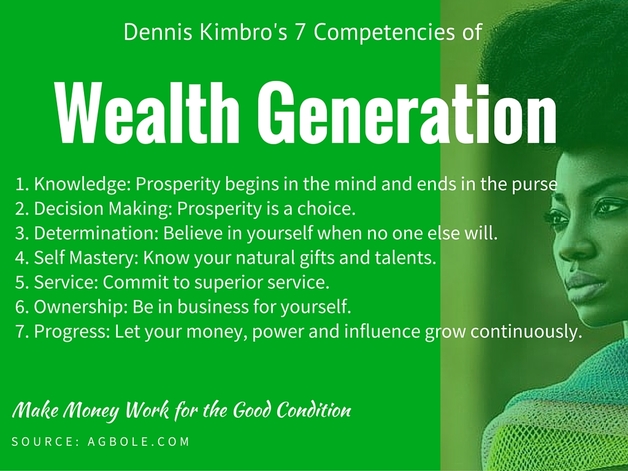

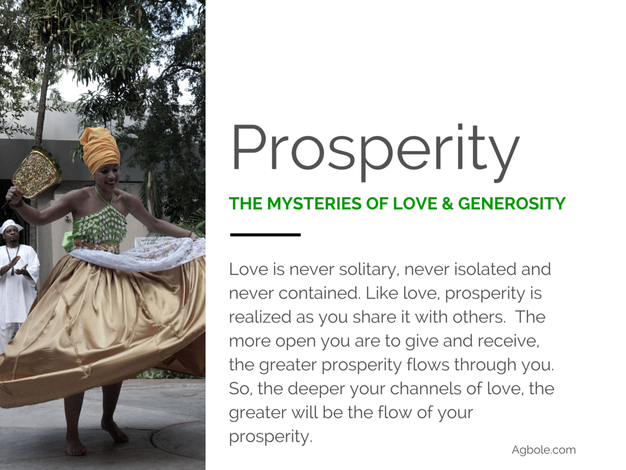

 RSS Feed
RSS Feed